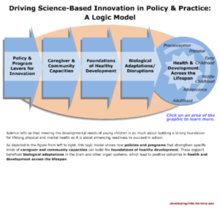This narrated interactive feature produced by the Harvard Center on the Developing Child presents a logic model showing how policies and programs that strengthen specific kinds of caregiver and community capacities can build the foundations of healthy development. These support beneficial biological adaptations in the brain and other organ systems, which lead to positive outcomes in health and development across the lifespan.
The interactive logic model is centered on three concepts:
- Brain development begins before birth and continues through adulthood.
- Experiencing adversity early in life can produce physiological disruptions or biological "memories" that upset development.
- The ability to change behavior decreases over time.
The narrated logic model contends that the presence or lack of three domains—(1) stable and responsive environment of relationships, (2) safe and supportive physical environments, and (3) sound and appropriate nutrition—will either nourish or interrupt development. The tool notes that effective policies to boost caregiver and community capacities that support development include legislative and administrative actions affecting public health, early care, child welfare, and other human services, and workplace policies related to flexible working hours and time off.

